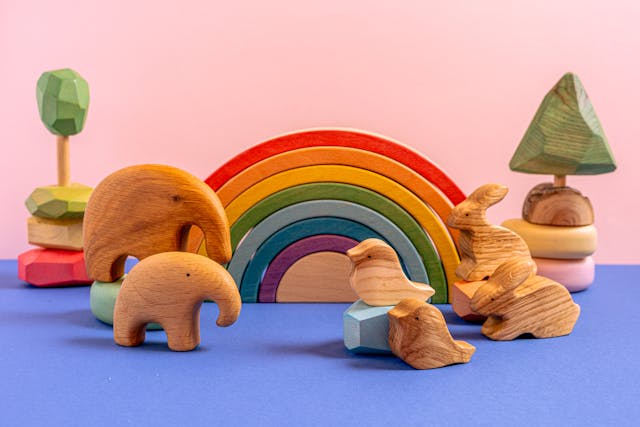The Montessori method, developed by Dr. Maria Montessori in the early 1900s, is a unique approach to early childhood education that encourages children to learn through self-directed activity, hands-on learning, and collaborative play. Montessori Toys, an essential component of this philosophy, are designed to promote independence, creativity, and critical thinking. In this blog, we will explore what Montessori toys are, why they matter, and how they can benefit children in their developmental journey.
What Are Montessori Toys?
Montessori toys are intentionally simple, often made from natural materials like wood, cotton, and metal. They are designed to be aesthetically pleasing, durable, and safe for young children to explore. These toys encourage children to engage in activities that reflect real-life tasks or experiences, fostering practical life skills alongside cognitive development. Unlike many mainstream toys, Montessori toys are open-ended, meaning that they can be used in a variety of ways, allowing for creativity and discovery without a rigid set of instructions.
Examples of Montessori toys include:
- Wooden puzzles that challenge spatial awareness and problem-solving.
- Building blocks that promote creativity, fine motor skills, and hand-eye coordination.
- Practical life toys such as child-sized kitchen tools or gardening sets that mimic adult tasks, promoting independence and real-world learning.
The Benefits of Montessori Toys
1. Fostering Independence
Montessori toys are designed to help children learn how to solve problems on their own. By offering them toys that challenge their cognitive abilities and motor skills, children can work independently to complete tasks. For instance, a simple wooden puzzle encourages children to think critically about how each piece fits, giving them a sense of accomplishment when they succeed without adult intervention.
2. Promoting Focus and Concentration
Unlike flashy, noisy toys that often overstimulate children, Montessori toys are quiet and purposeful. They engage children in deep, sustained concentration as they manipulate objects, solve problems, and explore textures and shapes. This focused attention builds strong neural connections in the brain and lays the groundwork for future learning.
3. Enhancing Fine Motor Skills
Toys like threading beads, stacking blocks, or pouring water help children refine their fine motor skills, which are crucial for everyday tasks like writing, tying shoes, and buttoning clothes. These activities strengthen hand-eye coordination and dexterity in a fun, engaging way.
4. Encouraging Creative Thinking
Because Montessori toys are open-ended, children are encouraged to use their imaginations and creativity to engage with them. A set of wooden blocks, for example, can become a house, a tower, or even a road. This open-ended play allows children to express themselves freely and think outside the box, laying the foundation for innovation and creativity later in life.
5. Supporting Sensory Development
Montessori toys often engage multiple senses at once. Toys like textured balls, smooth wooden blocks, or toys that make a gentle sound when shaken can enhance a child’s ability to process sensory information. This is crucial for developing balance, coordination, and sensory integration, which are vital for everything from walking to writing.
How to Choose Montessori Toys for Your Child
When selecting Montessori toys for your child, consider their stage of development. For infants, choose toys that stimulate sensory exploration, such as grasping toys or textured rattles. Toddlers can benefit from toys that encourage practical life skills, like child-sized utensils, while preschoolers might enjoy building materials or more complex puzzles that challenge their problem-solving abilities.
Here are a few things to look for when choosing Montessori toys:
- Natural Materials: Opt for wooden, cotton, or metal toys that are safe for exploration.
- Simplicity: Avoid overly complex or battery-operated toys. Montessori toys should be straightforward and engaging.
- Purposeful Design: Look for toys that serve a clear purpose, whether it’s enhancing motor skills, problem-solving, or practical life experiences.
- Age-Appropriate: Choose toys that align with your child’s developmental stage to ensure they can engage meaningfully with the toy.
Conclusion
Montessori toys are more than just playthings—they are essential tools for early childhood development. By choosing toys that are simple, purposeful, and aligned with your child’s developmental stage, you can foster a love of learning, independence, and creativity. Investing in Montessori toys is an investment in your child’s future, helping them grow into curious, confident, and capable individuals.
